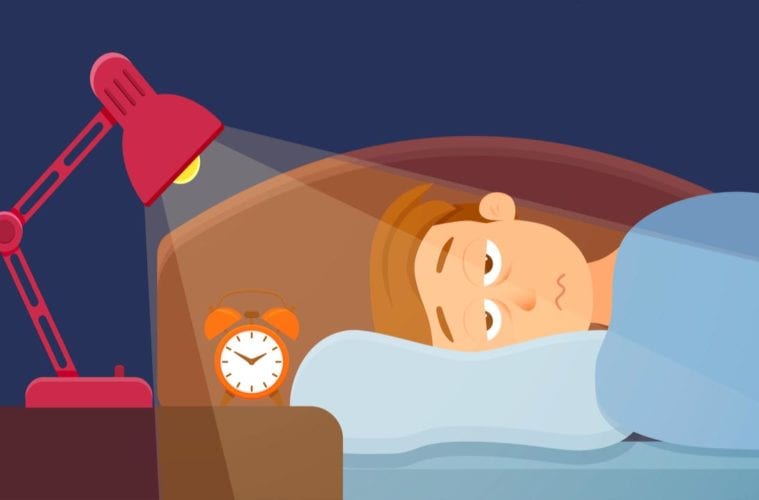Whether it’s a problem or not, there’s a good chance that you’ve experienced some type of sleep anxiety in your lifetime. That can mean it’s regularly, occasionally or, if you’re one of the lucky ones, it’s only happened a few times before.
Regardless of where you fall, though, sleep anxiety can be a serious problem that causes you to function on a lower level than you’re used to each day, which can lead to laziness, lack of concentration and even mental issues like alzheimer’s down the road. So, while it may not be a serious issue at first — and you think you can just nap to “make up” the lost sleep — think again, because it doesn’t work that way.
For those who might be struggling on some level with sleep anxiety, we’re here to help you try and overcome it. Why? Because it’s still the dead of winter and we’ve found ourselves incapable of sleeping well on a regular basis, struggling with when to go to bed, when to wake up and dealing with tossing and turning nearly every night.
Since a good night’s sleep is an important part of good health, here are some things to know about sleep anxiety, as well as some tips on how to overcome the real struggle of not being able to get a good night’s rest.
How is sleep anxiety defined?
You may not actually fear going to bed each night, but, due to sleep anxiety, it may be something that’s causing you to stay awake each night. That’s because your mind is worried that you’ll, once again, spend the night tossing and turning, with your mind running rampant with thoughts or worries.
Sleep anxiety is common in a lot of people, but is much more common in those who already have ADHD or are diagnosed with anxiety or depression. Likewise, sleep anxiety can be caused by outside factors like stress in work, your daily activities and how you spend the time leading up to you going to sleep each night.
For instance, some people deal with sleep anxiety by listening to music to help calm their mind, or using a sound machine for white noise, which can often help eliminate their own thoughts prior to falling asleep.
Can my phone be causing my sleep anxiety?
Yep, it sure can. If you’re on your phone a lot during those dark hours prior to sleeping, there’s a good chance that you’re not giving your mind the proper rest it needs. That means that, right before going to sleep, putting your phone down or, even better, keeping it in another room to help relieve any temptation to pick it up and use it.
Oftentimes, the light from your phone can be causing your brain to “wake up,” suppressing melatonin release that’s necessary to get a good night’s rest. So put the phone down and help yourself get rid of sleep anxiety.
How you spend the hour before going to bed can influence your sleep anxiety
Are you building up energy before you go to bed? Are you reading? Are you watching TV? Are you in a well lit room and then hope that you’ll be able to “turn it off” and go to a dark room to fall asleep? All of these things can be contributing factors as to why you’re not sleeping well, thus, causing sleep anxiety.
It’s important to understand that, how you spend that last hour or so awake, can influence how well you actually sleep. If you’re getting your heart rate up or aren’t prepping your brain for bedtime, you’re not going to end up sleeping well.
Avoid conversations, answering emails, staring at a phone or computer screen or thinking about tomorrow’s tasks before going to bed, because all of these things can be major factors towards sleep anxiety.
Sleep anxiety can be due to increased stress at work or in relationships
This isn’t too surprising since, you know, our minds often run wild when we have even the tiniest bit of stress on our plate. That’s normal, so don’t think you’ve got a problem is something at work is causing you to lose sleep. Of course, you don’t want it to consume you, so make sure you try to squash the problem as quickly as possible to increase your mental health.
If there’s something you’re specifically worrying about and just can’t shake it after a few weeks or longer, make sure you go talk to someone and see what they recommend. It could be as simple as finding better balance in your life, or, they may find that a sleeping pill is a good solution to help you pass out each night.
Stress impacts our lives in plenty of different ways, but when it creeps into your sleep cycle, it can be frustrating beyond repair if you allow it. So make sure you monitor your sleep each night and see what you might need to do in order to eliminate any sleep anxiety.
Limit your caffeine and your can help improve your sleep anxiety
This one should be natural because, as we all know, caffeine is a main substance in waking (or keeping) you up, as it provides a stimulant that gives the brain a jolt of energy. That’s great when you’re waking up early in the morning and going to work to get focused, but it’s not so great when you’re about to fall asleep.
Caffeine will only increase the odds of sleep anxiety, so avoid drinking it after a certain time of the day — around 1 p.m. is recommended — or just cut it out of your diet altogether, opting for things like caffeine-free teas or water; which will give you a small jolt in the moment, but won’t have the lasting impact of caffeine in coffee, chocolate or non-herbal teas.




